

Alexander Street Press. Oral Fluency Assessment Calculator for Grades 3-5. Reading fluency norms can serve as a stable benchmark for reading fluency.
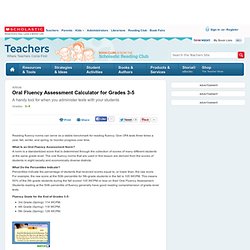
Give OFA tests three times a year, fall, winter, and spring, to monitor progress over time. What Is an Oral Fluency Assessment Norm? A norm is a standardized score that is determined through the collection of scores of many different students at the same grade level. The oral fluency norms that are used in this lesson are derived from the scores of students in eight racially and economically diverse districts.
What Do the Percentiles Indicate? Fluency Goals for the End of Grades 3-5: 3rd Grade (Spring): 114 WCPM. 4th Grade (Spring): 118 WCPM. 5th Grade (Spring): 128 WCPM. Readers Theatre. Home › Classroom Resources › Lesson Plans Lesson Plan Overview Featured Resources From Theory to Practice Students become excited and enthusiastic about reading when they are presented with the opportunity to participate in Readers Theatre.
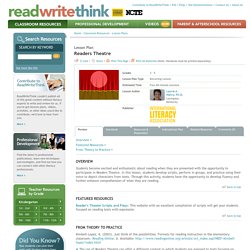
Back to top Reader’s Theater Scripts and Plays: This website with an excellent compilation of scripts will get your students focused on reading texts with expression Kimbell-Lopez, K. (2003). The use of Readers Theatre can offer a different context in which students are exposed to texts focusing on poetry, science, social studies, or other content-related topics.Readers Theatre is another way to enhance comprehension of text, as well as to create interest in and enthusiasm for learning.The Readers Theatre format provides an opportunity for students to develop fluency through multiple readings of the text by using expressiveness, intonation, and inflection when rehearsing the text.
Reader's Theater Scripts and Plays for the Classroom. Reader's Theater Scripts and Plays.
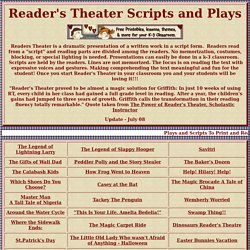
Readers Theatre Scripts. Phonics Worksheets: Full List. Consonant Sounds Consonant B b Worksheets, mini-books, and games that focus on the consonant letter b.
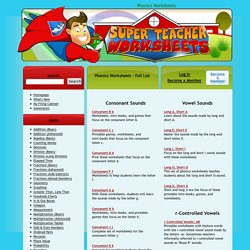
Consonant C c Printable games, worksheets, and mini-books that focus on the consonant letter c. Consonant D d Print these worksheets that focus on the consonant letter d. Consonant F f Worksheets to help students learn the letter f. Consonant G g With these worksheets, students will learn the sounds made by the letter g. Consonant H h Worksheets, mini-books, and printable games that focus on the letter h. Consonant J j Complete set of worksheets for the consonant letter j. Running Records. What is a Running Record?
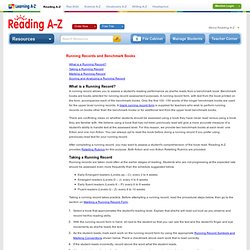
Taking a Running Record Marking a Running Record Scoring and Analyzing a Running Record What is a Running Record? A running record allows you to assess a student's reading performance as she/he reads from a benchmark book. Benchmark books are books selected for running record assessment purposes. A running record form, with text from the book printed on the form, accompanies each of the benchmark books. There are conflicting views on whether students should be assessed using a book they have never read versus using a book they are familiar with.
After completing a running record, you may want to assess a student's comprehension of the book read. DIBELS 6th Edition and IDEL Materials Downloads : UO DIBELS Data System. DIBELS 6th Edition Revised (Updated June 11, 2007) Important scoring information about new fields included in 6th Revised.
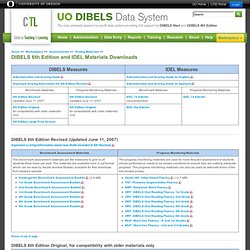
Return to top of page DIBELS 6th Edition Original, for compatibility with older materials only DIBELS 6th Edition Large Print Version IDEL 7a Edición Los materiales de evaluación de los indicadores del nivel de los estudiantes son medidas que deben dárseles a los estudiantes tres veces al año. Nota: Cuando evalúe la Fluidez en la Lectura Oral IDEL, administre los tres pasajes por cada sesión de evaluación y marque el valor medio (el que está entre el valor mayor y el menor). Alphabet Recognition Pages. Free activities to directly develop phonemic awareness skills in children and students for parents and teachers. Activities to Directly Develop Phonemic Awareness Skills Free Activities for Teachers and Parents Phonemic Awareness: Phonemic awareness, the ability to hear, distinguish, recognize and manipulate sounds within words, is critical to reading success.
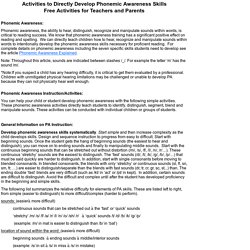
We know that phonemic awareness training has a significant positive effect on reading and spelling. We can directly teach children how to hear, recognize and manipulate sounds within words to intentionally develop the phonemic awareness skills necessary for proficient reading. Note: Throughout this article, sounds are indicated between slashes /_/. *Note:If you suspect a child has any hearing difficulty, it is critical to get them evaluated by a professional. Teaching parents and caregivers how to support early literacy development. Center for Research on Education, Diversity & Excellence (CREDE)
The Center for Research on Education, Diversity, and Excellence (CREDE) Hawai‘i Project promotes educators’ use of research-based strategies of effective practice for culturally and linguistically diverse students.
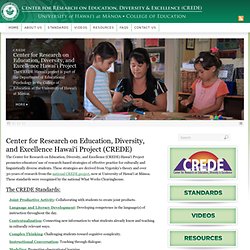
These strategies are derived from Vygotsky’s theory and over 30-years of research from the national CREDE project, now at University of Hawai‘i at Mānoa. These standards were recognized by the national What Works Clearinghouse. The CREDE Standards: Joint Productive Activity: Collaborating with students to create joint products.Language and Literacy Development: Developing competence in the language(s) of instruction throughout the day.Contextualization: Connecting new information to what students already know and teaching in culturally relevant ways.Complex Thinking: Challenging students toward cognitive complexity.Instructional Conversation: Teaching through dialogue.Modeling: Promoting observational learning.Child Directed Activity: Encouraging students’ decision-making.
Structure of Language - Introduction to Language. Alexander Street Press. Classroom Strategies. Free Reading Guides.